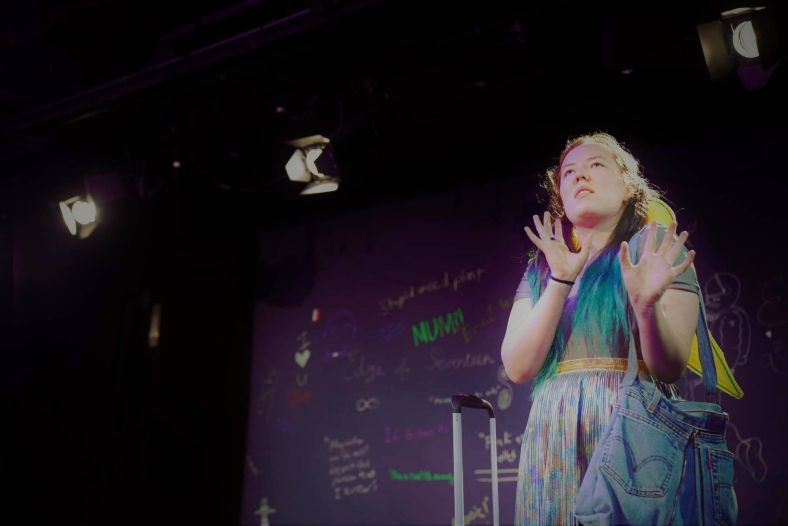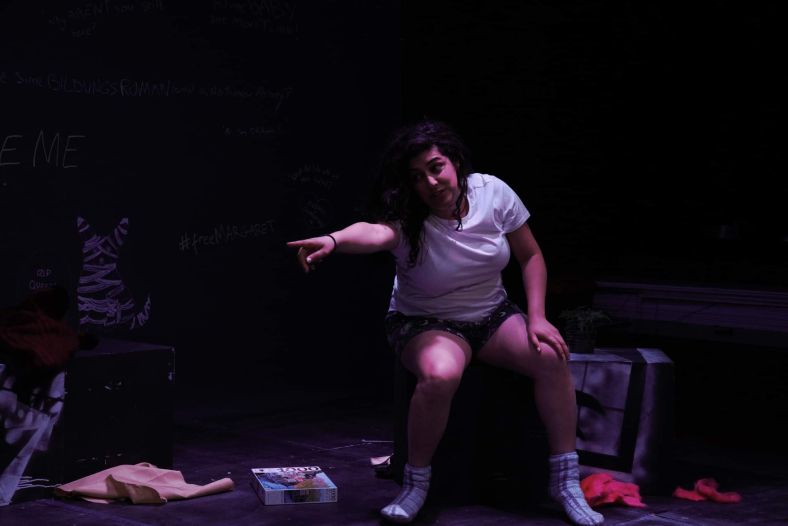Monologues rewrite the future of Australian theatre’s next generation
An idea dreamt up during COVID by playwright Laneikka Denne has given a voice to emerging playwrights and provided a valuable resource for HSC drama students delivering powerful monologues in their final exams.

Emily Lomman performs a monologue from The Monologue Collective production. Photo Kurt Davis.
In partnership with KXT, with support from PYT Fairfield, The Monologue Collective pilot writing program engaged 10 young writers to create monologues for students to perform for the HSC Drama Individual Performance, giving access to material that better reflects a teenager’s lived experience.
Supported by Create NSW’s Arts and Cultural Funding Program (Individual Project Funding), The Monologue Collective delivered multiple outcomes, engaging and developing the next generation of theatre professionals and bridging the gap between young emerging writers and publication.
Create NSW caught up Laneikka Denne, the young playwright behind the project, to learn more.
Tell us about the inspiration for The Monologue Collective. Where did your idea spring from?
The Monologue Collective was born out of the second COVID lockdown. I had just finished my HSC Drama exam the year prior, and I really struggled to find a monologue for someone in my age group that felt authentic to any sort of experience that me or my friends could relate to at the time. I decided to fix this issue by creating The Monologue Collective, a program where 10 young writers developed 6-8-minute monologues for HSC drama students to use for their individual performances. It's been amazing, at 19 years old, to have been able to run and produce such an incredible program from my brain to the stage, supported by Create NSW.
How did you find your 10 writers?
Accessibility is a huge issue within the theatre industry, especially for younger diverse kids who haven't had their voices represented. Theatre, as an artform, can be quite ageist and elitist. I conducted an online open call out through local youth groups and social media platforms to find any teenagers who were interested in writing and had a unique perspective. All they had to do was tell me (either visually, written, verbally) why their voice and perspective was important to hear. We didn’t focus on ensuring we hit ‘diversity’ criteria boxes but by having an easily accessible application process we ended up with kids who identified as living in Western Sydney, living with disability and mental illness, CaLD and part of the LGBTIQ+SB community. They were chosen not because of their identifiers but because their stories ended up being the most fascinating and urgent.
The process of writing the monologues was a year-long process, right? Was it an easy process, or did you find it challenging to achieve what you set out to do?
The prospect of writing such a lengthy monologue can be daunting for any writer. The aim was to stretch out the definition of a monologue which can be predominately white, cis and Eurocentric in its structure. I wanted the writers to be able to explore multidisciplinary work and to truly tell their stories with honesty.
For me, as a first-time, young program facilitator there was a lot of learning and exploration with how to provide the right tools to allow these writers to not only develop their monologue but also develop their writing skills and provide industry opportunities for their futures within theatre. I worked with dramaturge Riley Spadaro (musical theatre director) and Bernadette Fam (Malthouse Literary Manager) to develop a program where writers would be able to receive constant dramaturgical development and receive monthly workshops from established practitioners like Anchuli Felicia King (STC, Melbourne Theatre Company), Alana Valentine (Belvoir), Lewis Treston (STC), Ayeesha Ash (AD of Blackbird and TV writer for Stan) and many more.
What has been the outcomes of the project?
The Monologue Collective exceeded my expectations by a landslide. Originally, this was an unfunded idea that I had come up with in my bedroom. The program had the following success:
- Two sold out seasons at Kings Cross Theatre (KXT) and Shopfront Arts Co-Op to hundreds of HSC students
- A publishing deal with Play Lab Australia with hardcopies of the book now in over 100 schools and libraries across NSW
- Two OnSTAGE nominations, showcasing 2023 HSC students who have used the monologues written by the writers. (Held in February at the Seymour Centre, Chippendale, the OnSTAGE program features exemplary group and individual performances, script writing and video drama by HSC Drama students)
- A Sydney Theatre Award Nomination for Best Production by Young People
- Industry placements for two of the writers
“The success of The Monologue Collective shows us that young people want to see work made for them, by young people.”Laneikka Denne, playwright and program facilitator.
What difference did the funding from Create NSW make for the project?
The Create NSW ACFP grant funded our entire development process for these 10 writers. This included:
- Two dramaturge’s fees
- Seven established theatre practitioners workshop fees
- A program facilitator’s fee
Without this funding, we would not have been able to give these 10 writers dramaturgical support, writing skills and development workshops. Create NSW supported 10 young playwright’s development, enabling a greater impact for the future of Australia’s next generation of playwrights.
The 10 monologues by the young writers were very compelling. How have the 10 monologues been received by teenagers and HSC students?
It is the comments I’ve received from students that truly bring a smile to my face.
“Marcos your gay monologue made me have all the feels!!!” - Student aged 15, Nepean High School.
“My little queer soul was so so so warm after Claudia’s monologue” – Student aged 17, Dulwich Hill School of Visual Arts.
“Ayah’s monologue really made me feel heard as a young Muslim woman living in Australia today” – Anonymous.
When you’re a teenager the world is so huge and vast. Being a gender fluid, queer teenager I felt marginalised and made myself small. To be able to give teenagers the opportunity to tell their stories and have other teenagers connect, resonate and feel like they are finally heard by these works is the biggest gift Australian theatre could give.

Monologue Collective performed by Isabelle Nader. Photo Kurt Davis.
Why do you think engaging young people in theatre is so important right now?
The success of The Monologue Collective shows us that young people want to see work made for them, by young people. The Australian theatre industry audiences are overwhelmingly ageing due to theatre being inaccessible; financially, physically and content wise. If we want to continue using theatre for as a forum to make others feel something and or gain catharsis, we have to be actively championing marginalised and unique young voices that represent the Australia we live in today.
What was the most affirming aspect of the project for you?
The most affirming thing about The Monologue Collective is the joy it brings teenagers – those writing, acting, analysing and watching. I started out as a teenage playwright myself, and had my mentor Kim Hardwick not given me the chance to premiere my queer play DEAD SKIN, I would not be in the position I am today as a published playwright working at theatres like Belvoir St Theatre.
This project was a way to champion those who deserve to be championed. For that to have impacted teenagers’ lives positively is all I could ask for.
I’m really thankful that Create NSW took a chance on a young playwright and program facilitator, because without them, we wouldn’t have been able to provide these opportunities to teenagers.
Learn more about Create NSW’s Arts and Cultural Funding Program (Individual Project Funding).